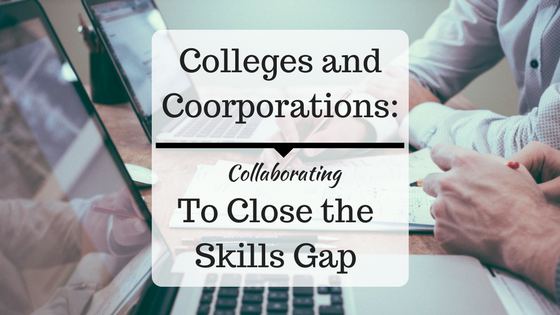
Although the commonalities between higher education and the corporate world may be far and few, there is one issue that is affecting both immensely – the skills gap. The skills gap refers to the expanding gap between the skills and knowledge of recent graduates entering the workforce and the skills and knowledge corporations believe their businesses need.
Higher education has always played a critical role in preparing students for the workforce as well as instilling civic responsibility and developing soft skills. However, the needs of the workforce and the knowledge graduates possess have fallen out of alignment (Closing the Skills Gap, Lumina Foundation).
Employers across industries agree that recent graduates lack the skills and knowledge their businesses need, specifically soft skills such as critical-thinking, communication, creativity, and the ability to work collaboratively. As the skills gap remains an important issue facing both the workforce and higher education, these two entities must begin to collaborate in order to remedy the skills discrepancy.
In a survey of 343 corporate executives, conducted by The Economist Intelligence Unit, it was found that “although the desire for collaboration with higher education is almost universal, there is a lack of coherence in how companies approach such partnerships, the kinds of institutions they seek to partner with and the benefits they expect to derive from such collaborations.”
Perhaps an obvious choice is using adjunct professors as a middleman or liaison. Often coming from professional fields in the workforce, adjunct professors bring practical “real-world” experience to higher education. Because of their unique connection to both sides of the equation, adjuncts can serve as a liaison between the needs of the workforce and the learning outcomes of higher education.
Traditionally an adjunct’s role has been limited to facilitating classes and advising students, but what if adjuncts were involved in curriculum and program development? What effects would this have on the skills gap? Insight from working practitioners, who know what their industry needs in terms of talent, could make a tremendous impact on closing the skills gap.
One institution who is putting this idea into practice is the Haas School of Business at the University of California Berkeley. Berkeley-Haas accepts and encourages curriculum input from its adjunct faculty. Berkeley-Haas’ professional faculty also participate in curriculum redesign discussions. Their role is to contribute ideas from the world of practice, however, they do not vote on what classes are included or subtracted from the curriculum (Adjusting for Adjuncts, BizEd).
Collaboration between traditional tenure faculty and adjunct professors can provide students with the appropriate curriculum, instruction, and learning outcomes they need to be successful in the workforce and close the skills gap.

